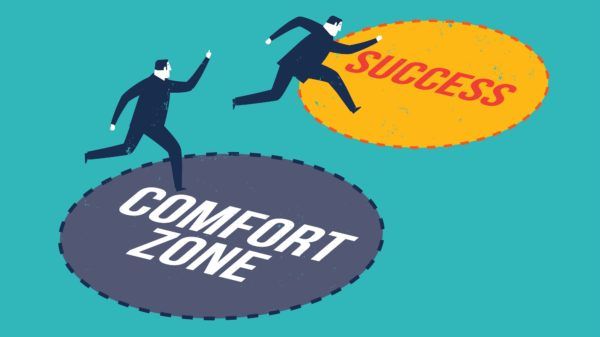Reasons To Get Out Of Your Comfort Zone

When in your comfort zone, your brain doesn’t want anything to change. Your needs are met, you have zero stress, and your brain recognizes that the body is surviving. It’s a recipe for steady performance. Your brain especially doesn’t like change. It requires so much energy for day-to-day activity that it doesn’t want to give extra resources to the attention required to do new things.
Getting out of your comfort zone from time to time creates just enough good stress to ramp up your focus, creativity, pace, and drive, and it helps you respond to life stress when unexpected things happen.
Change can be an uphill battle as it is, and depending on what the scenario is, your brain might not do you any favors. There are ways to help your brain adapt to change a little more easily, but first, there are a few things to understand about your brain.
Your brain is busy. It hogs a ton of your energy resources to do what it needs to do every day, especially when you’re sleeping. Your brain is lazy. Because it needs so much energy and there’s so much going on up there, it doesn’t want to do extra things. It doesn’t know the difference between a good new habit and a bad new habit, so it tries to get you to do what you’ve always done, by staying inside your comfort zone. Your brain wants to keep you safe. Your own survival and the survival of the species depends on avoiding danger. Humans are built to live in a world where we have everyday threats to survival, like hungry cheetahs. Sometimes your brain fires up the oh-crap-there’s-a-cheetah fear response when it’s more like, you’re a few minutes late for class and most likely not going to die because of it. Your brain doesn’t always respond with the proper intensity. Because of these tendencies, your brain craves routine. But doing the same song and dance every day of your life doesn’t lead to growth and maximum performance. More on why in a minute.
Getting out of your comfort zone from time to time alters your brain’s tolerance to change, for the better. Shaking things up every now and again shows your brain that there’s nothing to fear — you’ll be fine on the other side of a little stress, and it’s worth it. Keep reading to find out why it’s hard to force yourself out of your comfort zone, why you should do it anyway, and things to try.
Change is hard because you’re wired to expect the worst. Getting out of your comfort zone is hard because humans are wired to expect the worst-case scenario. Your brain wants to keep you safe, so you have a natural negativity bias — a stronger reaction to actual or anticipated negative events. When you’re evaluating whether or not to take action and you receive negative information, it influences you more strongly than equally positive information. If the scenario already occurred, studies show people tend to give more weight to negative events. Say you rated a situation on a scale, one being the worst and 10 being the best. If the consequence was bad, it’s human nature to give it a lower rating than it deserves. If the consequence was positive, you’ll tend to rate it less positive than it deserves and more toward neutral.
This thought process carries over to predicting outcomes. Researchers hooked participants up to electrodes to measure brain activity during positive and negative stimuli. Negative stimuli created stronger activity than positive stimuli, even though the stimuli were equally probable to happen in real life and they were equally extreme.
Practice mindfulness to be less afraid of the unknown
How do you re-calibrate your evaluations? Mindfulness.
Researchers found that mindfulness reduces negativity bias. A researcher-assigned mindfulness practice increased participants’ overall optimism and they were more likely to give appropriate weight to positive and negative scenarios.
There are a zillion ways to be more mindful. One that you can do throughout the day is to intentionally shift your habits and patterns. (Yes, that means getting out of your comfort zone, even if only a little.)
Meditation, mindful movement and mindful eating are good practices, but you can work mindfulness into the tasks you’re already doing, too. On this episode of Bulletproof Radio , Pedram Shojai offers some small tweaks you can make for a frequent boost of low-level stress that will shake you awake.
Taking risks helps you respond better to stress When you take a risk on purpose, you’ve weighed the pros and cons, and you’ve evaluated the possible outcomes. Good things can happen, or bad things can happen, and you go for it anyway. You’re capable of dreaming up a lot of gloom and doom in your head, and a lot of the time, you expect the worst. Most of the time, taking a calculated risk produces a favorable outcome. When it doesn’t turn out as you’d hoped, chances are, everything’s still a-o-k after it all shakes out. When you routinely experience the thrill of taking a risk and it turns out awesome, or it turns out disappointing but ultimately things are still fine, you’re actually practicing for those unwelcome surprises in life. There are times when things will happen that you didn’t prepare for, and you will need to deal. When you’re used to seeing that everything is fine on the other side of stressful events, you can put your head down and do what you need to do to react appropriately, instead of reacting in a way that doesn’t suit the situation.
You’ll learn what you’re really made of If you’re always calm and working within your same old habits, how will you ever learn what you truly can handle?
Forcing yourself into discomfort then seeing the result will keep you pushing yourself. When there’s an element of uncertainty and you come out on the other side either the same or better than you were before, you’ll have the confidence to take the opportunity to kick it up a notch toward something that has the potential to be amazing.
Sure, things can go the other way, and results can range from disappointing to the worst outcome you considered.
But that’s the thing — you already considered that the outcome could be bad, which means you’re still in control. When you feel in control, you can deal with anything that comes out of it. Even when things turn sour, you know it’s temporary, you know you can bounce back, and you’re more likely to push past your comfort zone again. With some practice, you’ll learn what you’re made of.
Shaking things up ramps up productivity
When everything is hunky-dory, your brain doesn’t want anything to change. Your needs are met, you have zero stress, and your brain recognizes that the body is surviving. It’s a recipe for steady performance.
You know deep down, you’re capable of more. In order to maximize performance, you need to be up against it from time to time.
According to the Yerkes Dodson law, feeling comfortable does zilch-o for your growth. If you’re cozy in your ways, you’ll do the bare minimum.
To make progress, you need to feel a little pressure. Whether it’s a deadline, a number in your bank account, or a sales goal, a low level surge of uneasiness may be just what you need to take it to the next level.
The burst of stress from stepping outside your comfort zone doesn’t just create a “hurry up” effect. Sure, your pace increases, but other things improve, like: If you don’t have these external pressures nudging your performance upward, how do you self-impose a little stress? You guessed it – work outside of your comfort zone. This can range from changing your workflow so you have to pay close attention to what you’re doing, or taking your work elsewhere for a change of scenery. Or, you can take on a project that flat-out scares you. In the typical workplace, people aren’t short on these swells of panic, and you should be aware of that, too. Too much stress affects your physical body and tanks your performance. So, it’s something to consciously balance. Head on over here for ways to manage stress .
Blunders come with benefits
So, you calculated a risk, identified some positive outcomes and some negative ones, and went for it.
And the bad thing happened.
You chalk the whole endeavor up as a mistake. In the grand scheme, everything is fine, but you’re bummed. You were hoping for it to go the other way. Failures are okay. Every CEO and successful person’s biography highlights failed plans, pointing out that mistakes don’t define you. Actually, mistakes are celebrated as high points in the learning process. But did you know there’s another big benefit to making mistakes? Imperfections make people like you.
According to the Pratfall Effect,
people who never make mistakes aren’t as likable as people who trip up, literally and figuratively, from time to time. It shows your flaws and your humanness, which are qualities that draw people to you. There are exceptions. If you’re a jerk, mistakes affirm others’ opinions that you’re awful. So if you’re nice to people, mistakes are not only allowed but beneficial to your social life.
Hi. I am @greetbot - a bot that uses AI to look for newbies who write good content!

Your post was approved by me. As reward it will be resteemed by a resteeming service.
Resteemed by @resteembot! Good Luck!
The resteem was paid by @greetbot
Curious?
The @resteembot's introduction post
Get more from @resteembot with the #resteembotsentme initiative
Check out the great posts I already resteemed.